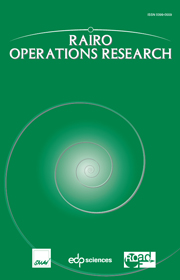Crossref Citations
This article has been cited by the following publications. This list is generated based on data provided by Crossref.
Kis, Tamás
2009.
Scheduling multiprocessor UET tasks of two sizes.
Theoretical Computer Science,
Vol. 410,
Issue. 47-49,
p.
4864.
Kaddoussi, Ayda
Zoghlami, Nesrine
Hammadi, Slim
and
Zgaya, Hayfa
2013.
An Agent-Based Distributed Scheduling For Crisis Management Supply Chain.
International Journal of Computational Intelligence Systems,
Vol. 6,
Issue. 1,
p.
156.
Kacem, Adel
and
Dammak, Abdelaziz
2014.
A genetic algorithm to minimize the makespan on two dedicated processors.
p.
400.
Kacem, Adel
and
Dammak, Abdelaziz
2017.
A genetic algorithm to minimize the total of tardiness multiprocessing tasks on two dedicated processors.
p.
0085.
Kacem, Adel
and
Dammak, Abdelaziz
2021.
Multi-objective scheduling on two dedicated processors.
TOP,
Vol. 29,
Issue. 3,
p.
694.
Aïder, Méziane
Baatout, Fatma Zohra
and
Hifi, Mhand
2021.
A look-ahead strategy-based method for scheduling multiprocessor tasks on two dedicated processors.
Computers & Industrial Engineering,
Vol. 158,
Issue. ,
p.
107388.
Aïder, Méziane
Baatout, Fatma Zohra
and
Hifi, Mhand
2022.
Recent Advances in Computational Optimization.
Vol. 986,
Issue. ,
p.
157.
Baatout, Fatma-Zohra
and
Hifi, Mhand
2023.
A two-phase hybrid evolutionary algorithm for solving the bi-objective scheduling multiprocessor tasks on two dedicated processors.
Journal of Heuristics,
Vol. 29,
Issue. 2-3,
p.
229.


